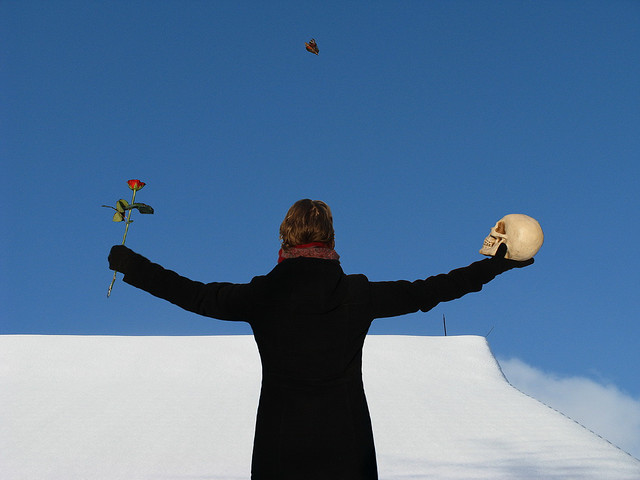The recent death of Justice Antonin Scalia brought to mind deaths in my own family.
Most memorably, it brought back to me how my grandmother died.
She always said that my grandpa had it easy. He walked into the house one February day after supervising the snow shoveling and put his hat and gloves on the table. He turned around and fell straight to the ground—a fatal heart attack. He was dead before he hit the ground.
Rather neat, if you think about it. No long hospitalization, no decaying of dignity, no endless prolongation of a life well-lived.
Apparently, that may indeed have been the issue with Justice Scalia.
Go to bed one night and simply not wake up. How sweet is that, really? I mean, given the all-out efforts some people endure to live a life that is no longer quality but really only an extension of pain and suffering. I’ll take the fatal heart attack, thanks.
Grandma lived to 95. It’s a habit of the women in our family: we don’t like to leave. After Grandpa died, she was angry. God had messed this one up badly, she thought. And the longer she lived, the more wrong God had it. She was mad. She was furious.
How dare God not take her?
And don’t give her that old sop about God’s not ready for you yet. By Heaven, she was ready, so just open the blasted gates now and let her in!
She died in a nursing home not in a suite in a palatial ranch—though the fees charged by nursing homes are palatial to many. She died with family surrounding her and nuns praying the rosary in the hallway.
But it wasn’t a peaceful death.
Her body, in the end, betrayed her. As her mind left, as her organs failed, her heart beat strongly on. There’s nothing we can do to quell a heart that refuses to stop. We can only guess at the unfinished business that might have been part of the plan of the Universe. She was always afraid that she would not die peacefully in her sleep. How much of that fear played into what really happened, we’ll never know.
The day before she died, I was there with a group of immediate family members. We all were saying our goodbyes and someone popped a CD in the player. I’m the family cantor—I started singing. My grandma visibly relaxed when she heard the hymn Here I Am, Lord—one of her favorites.
After a while, she seemed uncomfortable so two nurses asked us all to leave. They turned her to face the window. They opened the drapes, cracked the window open and told her it was okay to go. We left her then, with her two daughters, as they wished. She died about four hours after that.
I remember this clearly.
And as I read more about the Justice, I contrast the public scenario of his death with the private deaths that take place every day. The deaths that aren’t in a luxury ranch. The deaths which are not simple. The deaths that happen among each and every family, each and every day.
Fame brings a peculiar aura to a death. Fame brings a microscope. My granny wouldn’t have appreciated that microscope, especially since she was a prim and proper church lady who always had her lipstick on and her hair done. Her death was ugly and only prettied up for the obituary.
But in the final analysis, death comes to us all. Grandma railed and ranted about wanting death more quickly. I don’t know—is this a common thread? Does the 106-year-old want what he or she may see as the ultimate comfort of death? Does the 80-year-old think it’s time? Does anyone? Do we all fear the “last sleep” that we must all fall into—the great equalizer?
In the final analysis, does it matter at all?
We all die. Every single one of us will face this and we’ll face it in the knowledge that we have no control over it. What we can control is what we do before we die.
How we live.
What we embrace.
What we refute.
What we say to those we love and what we say to those we don’t love.
What we can control is all the attendant paperwork. Having the talk with the family about what we wish, how we want our death to be medically managed and having our living wills and durable powers of attorney in place. Making our doctors aware of DNR—do not resuscitate—requests. Being brave enough to speak early and often to our loved ones about the one sure bet: that we’ll all die in time.
We won’t likely make the national and international news, but we’ll all die. All we can do is our best to make it a good death.
~
Relephant Read:
Lessons in Deathbed Living.
~
Author: Pat Perrier
Apprentice Editor: Lois Person/ Editor: Khara-Jade Warren
Photo: Hartwig HKD/ Flickr
~












Read 4 comments and reply